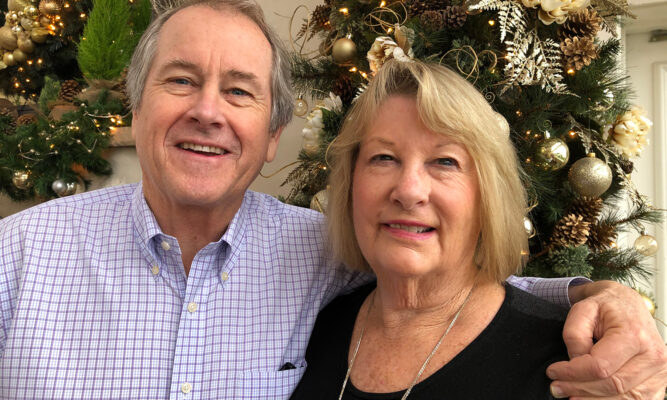Dana-Farber’s Bing Center for Waldenström’s Macroglobulinemia is the world’s largest referral center for a rare blood cancer that occurs in only about 1,500 patients each year. Tim Bliss, of Santa Barbara, California, is one of them.
When Bliss was diagnosed in 2017, his research quickly led him to Dana-Farber and Steven Treon, MD, PhD, director of the Bing Center. It wasn’t long before Bliss began commuting from the West Coast several times a year for consultations and treatment.
“The team at the Bing Center are extraordinarily capable, but, more than that, extremely passionate,” said Bliss, a partner in Partners Fund Capital. “They want to solve Waldenström’s in the worst way. It’s a life’s work for them.”
That’s why Tim and his wife, Ginny, are giving Dana-Farber $2.2 million to establish an investigatorship to support the work of a mid-career researcher to be selected by Treon. Computational biologist Zachary Hunter, PhD, has been named the inaugural incumbent.
“The reason we have made so much progress in the Bing Center is because we’ve been able to do basic as well as translational science,” said Treon, crediting Hunter’s key role in the breakthrough discovery of the MYD88 mutation. Hunter later found the second-most common mutation in Waldenström’s, the CXCR4 gene. Knowing which mutation a patient has allows doctors to offer the treatment regimen most likely to be effective.
“Literally thousands of lives have now been impacted by these truly seminal discoveries and the Blisses have given us the opportunity to make generational advancements in this disease,” Treon said, noting that the couple have also made previous gifts to support Hunter’s research. “Zach is one of the most respected individuals in the genomics field for our disease. We’re so happy that the Blisses have enabled him to continue his career at our Institute.”
Endowed investigatorships support the work of one or more leading physician-scientists at the mid-point of their career and help Dana-Farber attract and retain faculty of the highest quality.
By endowing the new investigatorship, said Tim Bliss, “we feel we’re supporting research for a disease that doesn’t get a lot of financial support, and a team that’s really exceptional, passionate, and capable.”
Hunter said the Blisses’ gift will fund more early stage research as well as provide financial stability for him and his family. “It’s a really big deal,” he said. “I’m so thankful.”
For more stories about the impact of philanthropy at Dana-Farber, please visit DanaFarberImpact.org.



